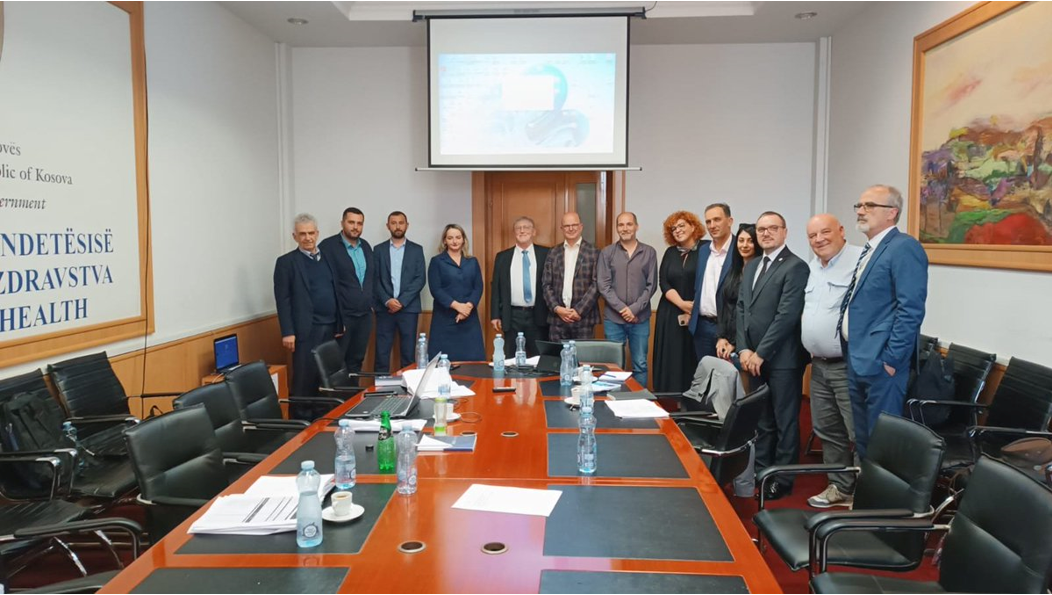The Ministry of Health of Kosovo*, together with the technical working group on health insurance and the public experts mobilized by SOCIEUX+, launched a cooperation on Universal Health Coverage. In Pristina, peer-to-peer exchanges about the legal framework for health insurance, in May 2023. (SOCIEUX+ 2023-09).
Picture courtesy of the Ministry of Health.
The beginning of 2023 was the start of an important milestone for SOCIEUX+: the receipt of the first requests from partner countries in the Western Balkans region, following the extension of cooperation activities in the second half of 2022. From January to mid-June, 28 requests were submitted to SOCIEUX+ from new partners in Bosnia & Herzegovina, Kosovo*, Montenegro, North Macedonia, and Serbia.
The applications were centered around a few major topics. In the social protection sphere, child protection, health systems, disability, and pensions represent the thematic priorities of the requesting institutions, which intend to tackle these issues from the different angles of institutional, organizational, and individual capacities.
A few examples of these requests can provide a clearer picture of their needs. From Kosovo Montenegro, North Macedonia, and Bosnia & Herzegovina, partners requested SOCIEUX+ to support the development of case workers’ skills, as well as practical approaches for social work and basic services, with a specific focus on protection of the rights of vulnerable children and family policies.
Other requests – from Kosovo and North Macedonia – aim to build an inclusive society and promote the rights of persons with disabilities by addressing both practitioners and legal frameworks. The Ministries of Health of Kosovo and Montenegro sought support to deepen the legal framework governing the national health insurance system, and to strengthen the capacity and organizational processes that monitor and ultimately improve the quality of public health service provision, respectively.
Other requests, related to pension systems and social security administrations, tackle organizational capacities. Montenegro requested support to reinforce the business processes that govern pension schemes and understand the conditions for specific pension regimens and workers in hazardous and burdensome occupations. Serbia submitted a request to enhance research and strategic reporting skills and methodologies. Finally, ministerial level applications for the expansion of social protection coverage, as submitted by North Macedonia, look into ways of providing tailored social security coverage to unregistered workers.
In terms of labour & employment, the key concern of Western Balkan applicants is employment promotion, as well as the related functional domain of labour market analysis. Occupational safety and health was also addressed in a couple of requests.
The National Employment Promotion Service of Serbia will start a peer-to-peer cooperation activity intended to fine tune the strategies and tools that integrate persons with disabilities into an inclusive labour market, while partners from Bosnia & Herzegovina, Kosovo, and North Macedonia aim to enhance internal capacities to evaluate employment-promotion strategies, develop data-based analysis and decision-making, and enhance strategic planning skills for setting targets and providing the necessary inputs for successful achievement of goals.
Labour market analysis and employability skills assessments are also interesting to partner institutions looking to promote sustainable employment for the future, such as “green jobs,” or to respond to the pressing need of local youth to access high quality employment.
Finally, safety and security at work remain key concerns of partner institutions, as in Serbia, which is keen to look into recent strategies to protect workers exposed to extreme seasonal temperatures, or in the cases of Montenegro and North Macedonia, which are requesting updates to their labor inspectorates’ functions.
The SOCIEUX+ team has been working hard to kick off cooperation agreements with applicant institutions, beginning with a technical dialogue that results in a common understanding of the scope of work, then determining the objectives to be pursued and the results to be achieved through peer-to-peer technical exchanges. In the planned missions, the partners’ local staff and their counterparts – civil servants of EU Member States – will conduct a deep dive into the partner countries’ policies, norms, and organizational capacities.
At the time of writing, the majority of the 28 received requests have already been converted into Actions, with SOCIEUX+ staff endeavoring to identify and subsequently mobilize European public experts to work with our new partner institutions.
The first missions in the Western Balkan region have started in May, 2023. In Kosovo, experts from Luxembourg and Portugal are supporting a national committee of experts to review the 2014 Law on Health Insurance, with the objective of reinforcing the role of the National Health Fund and ultimately advancing universal health coverage. Health-related peer-to-peer exchanges have also started between experts from the Ministry of Health of Montenegro and their partners from Croatia and Portugal, who are helping to analyze the Ministry’s quality control system in the broad area of governance of the health sector. Finally, the Institute for Social and Child Care of Montenegro is working with Croatian and Hungarian experts who are assessing the normative background, role of local and national authorities, capacities of case workers, and the referral and coordination systems that are essential components of a fully developed foster care system for children without parental support.
As the work is just starting, we hope that our partner institutions and participating experts will engage in fruitful peer-to-peer exchanges for a long time to come.
Gian Luca Portacolone
SOCIEUX+ Coordinator of Operations
Prospected SOCIEUX+ capacity building support
based on received requests from Western Balkans
| Institutional capacities | Organizational capacities | Individual capacities | |||
|---|---|---|---|---|---|
|
|
|
|||
*This designation is without prejudice to positions on status, and is in line with UNSCR 1244/1999 and the ICJ Opinion on the Kosovo declaration of independence.







